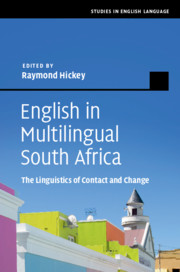Book contents
- English in Multilingual South Africa
- Studies in English Language
- English in Multilingual South Africa
- Copyright page
- Contents
- Figures
- Maps
- Tables
- Contributors
- Preface
- I A Framework for English in South Africa
- II Sociolinguistics, Globalisation and Multilingualism
- III Language Interfaces
- Chapter 12 Present-Day Afrikaans in Contact with English
- Chapter 13 Shift Varieties as a Typological Class?
- Chapter 14 Language Use and Language Shift in Post-Apartheid South Africa
- Chapter 15 English Prepositions in isiXhosa Spaces: Evidence from Code-Switching
- Chapter 16 Aspects of Sentence Intonation in Black South African English
- Chapter 17 The Development of Cognitive-Linguistic Skills in Multilingual Learners: A Perspective of Northern Sotho–English Children
- Chapter 18 Linguistic Interference in Interpreting from English to South African Sign Language
- Timeline for South African History
- Glossary
- Index
- References
Chapter 14 - Language Use and Language Shift in Post-Apartheid South Africa
from III - Language Interfaces
Published online by Cambridge University Press: 07 November 2019
- English in Multilingual South Africa
- Studies in English Language
- English in Multilingual South Africa
- Copyright page
- Contents
- Figures
- Maps
- Tables
- Contributors
- Preface
- I A Framework for English in South Africa
- II Sociolinguistics, Globalisation and Multilingualism
- III Language Interfaces
- Chapter 12 Present-Day Afrikaans in Contact with English
- Chapter 13 Shift Varieties as a Typological Class?
- Chapter 14 Language Use and Language Shift in Post-Apartheid South Africa
- Chapter 15 English Prepositions in isiXhosa Spaces: Evidence from Code-Switching
- Chapter 16 Aspects of Sentence Intonation in Black South African English
- Chapter 17 The Development of Cognitive-Linguistic Skills in Multilingual Learners: A Perspective of Northern Sotho–English Children
- Chapter 18 Linguistic Interference in Interpreting from English to South African Sign Language
- Timeline for South African History
- Glossary
- Index
- References
Summary
This chapter examines the evidence of language shifts to English in post-apartheid South Africa. We first present a brief overview of the language situation in South Africa and offer a review of the literature on language shift. A number of scholars have expressed concern that the maintenance of language diversity in South Africa is threatened by the dominance of English in schooling and the economy. However, other studies find that despite an increased use of English, mother-tongue languages have retained their cultural value as languages of identification. Moreover, recent quantitative work shows that among Africans the increased use of English is associated primarily with an increase in bilingualism rather than with the displacement of Bantu languages by English. We add to this literature with an analysis of Population Census data from 1996 to 2011 to investigate possible language shift from Afrikaans to English, particularly among Coloureds. We show that, despite a small decline in the use of Afrikaans as L1 and a corresponding rise in the use of English, the overall use of Afrikaans increased, because of the considerable growth in English–Afrikaans bilingualism.
- Type
- Chapter
- Information
- English in Multilingual South AfricaThe Linguistics of Contact and Change, pp. 288 - 309Publisher: Cambridge University PressPrint publication year: 2019
References
- 2
- Cited by



